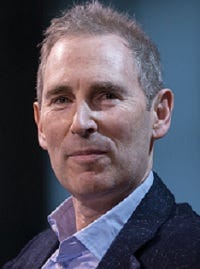Amazon Also in the Hyperscaler Race With Bedrock
Generative AI service has thousands of users; Amazon can service its strong AWS client base and seek advantages based on its custom AI chips, such as on price
By John P. Desmond, Editor, AI in Business

Microsoft with its investment in OpenAI and Google with its sprawling investments across its many products, have garnered most of the attention around AI in business, but Amazon CEO Andy Jassy reminded people earlier this month that Amazon is also in the hyperscaler race, of companies with massive data centers and a cloud infrastructure to support their businesses.
Challenging the notion that Amazon has fallen behind Microsoft and Google in the competition to commercialize the increasing power of AI, Amazon CEO Jassy stated in a recent interview with CNBC that “Most people are focused on the applications, you know, things like ChatGPT brought everybody’s awareness up, but I think of generative AI as having three macro layers.”
At the bottom are chips that can handle AI, and Amazon has developed its own. And the company sees Amazon Web Services as a business that can exploit AI commercially. To that end, AWS earlier this year announced a generative AI service called Bedrock, that enables clients to use language models from Amazon and other startups to develop their own AI applications.
On the chip front, AWS has developed the AI-specific chips Inferentia and Trainium, aimed at making it easier for developers to run large AI models in the cloud. In this market, Amazon is going against Nvidia, which dominates the market for AI chips and that Microsoft relies on heavily. Jassy stated that Amazon expects its chips to have “much better price-performance than you’ll find anywhere else.” He added, “We're quite optimistic that a lot of machine learning and training inference will be done on AWS chips and compute."
While Amazon invests in AI, it is cutting costs in other areas due to slowing sales, recently laying off 27,000 employees, the largest layoff in its history. Also, Amazon paused expansion of its Fresh supermarket and Go convenience store chains, and the company ended its Care telehealth service.
Bedrock Has an AWS User Base
Amazon has attracted thousands of customers to its Bedrock service, including from Sony, Ryanair and SunLife, according to a recent account from Reuters out of the company's AWS Summit held in New York. Amazon also announced several initiatives: including a program for building more conversational customer-service agents, technology access from the startup Cohere and a healthcare system for generating clinical notes after a patient visit.
The Bedrock service enables businesses to create applications with a range of AI models, stated Vice President Swami Sivasubramanian, who delivered a keynote talk at the event. Bedrock is said to be Amazon’s answer to cloud services announced by Google and Microsoft.
"Our mission is to make every company an AI company," stated Sivasubramanian, in an interview with Reuters at the AWS Summit.
According to a recent summary from History Computer, Amazon is the largest cloud provider in the world, with related revenue of $62 billion in 2022, followed by: Microsoft Azure, $51.2B; IBM Cloud, $12.7B; Google Cloud Platform, $19.2B; and Alibaba Cloud, $12B, making the top five.
Amazon plans to offer a broader range of AI models than peers to win business, including access to updated technology from startups Anthropic and Stability AI, the company stated.
Amazon Bedrock is not yet generally available to any customer and no availability date was announced; Sivasubramanian said the company is addressing issues around cost allocation and enterprise controls to prepare for availability.
Not abandoning the healthcare market, Amazon announced a new AWS HealthScribe service, aimed at enabling software suppliers to build apps to transcribe and analyze conversations between a doctor and a patient. A unit of 3M was said to be planning to use the service to speed up clinical documentation.
As the top cloud players engage in building out more data centers to support their services, they battle each other for the necessary AI chips from Nvidia. Amazon and Google have developed their own specialized AI chips, which they make available only to customers of their cloud service.
Competing on Price in Cloud Services, Using Custom Chips
Amazon plans to compete on price with its cloud services, according to an earlier account from Reuters, based on a Reuters event in Texas on July 11. Dilip Kumar, VP, Amazon Applications, said Amazon’s custom AI chips will give the company the ability to compete on price.
"These models are expensive," Kumar stated at the Reuters Momentum conference in Austin. "We're taking on a lot of that undifferentiated heavy lifting, so as to be able to lower the cost for our customers."
A recent report on the blog of TelcoDR seems to support this notion. The AWS Inferentia chips are able to deliver 45 percent lower cost per inference than GPU-based instances, according to the account. And Google has claimed that its TPU chips can deliver up to 80 percent lower cost per training than GPU-based instances. TelcoDR runs a fund to invest in telecommunications software companies modernizing the public cloud. Founder and CEO Danielle Royston, with 25 years of enterprise software experience, has raised $1 billion for the fund.
[Editor’s note: The following excerpt is from “AI in Business: 2018” by John P. Desmond.]
Amazon reached a trillion dollar market capitalization in September 2018, five weeks after Apple, the first company to accomplish the feat. AWS grew 50 percent in Q2 of 2018. RBC Capital Markets analyst Mark Mahaney told CNBC, “Yes, Amazon did really well in online retail, but then the stock gapped up when they showed that they could become successful in cloud. It’s almost like the ticker changed from AMZN to AWS.”
Amazon had arguably rewired the entire company around AI. CEO Jeff Bezos in 2014 was asking for “six pagers” -- his legendary format for new product and service proposals, which include a press release at the end announcing the innovation -- about how AI could transform whatever unit of the company the presenter represented.
One of the presenters was Srikanth Thirumalai, the head of Amazon’s recommendation team, a computer scientist who had left IBM in 2005. He proposed a sweeping new plan to incorporate the latest advances in AI into his division. Amazon had relied on AI for its recommendations, and robots in its shipping warehouses for years, but Bezos was looking for a company-wide transformation that exploited recent gains in AI research.
Thirumalai was one of many company leaders who presented Bezos with variations on the theme of using AI to transform their business units.
“We went out to every [team] leader, to basically say, ‘How can you use these techniques and embed them into your own businesses?’” stated David Limp, Amazon’s VP of devices and services, in an account in Wired.
At the time, Amazon’s AI expertise was in pockets throughout the company.
See the source articles and information from CNBC, Reuters, from History Computer, from Reuters again, from the blog of TelcoDR and from “AI in Business: 2018”.
(Write to the editor here; tell him what you want to read about in AI in Business.)




